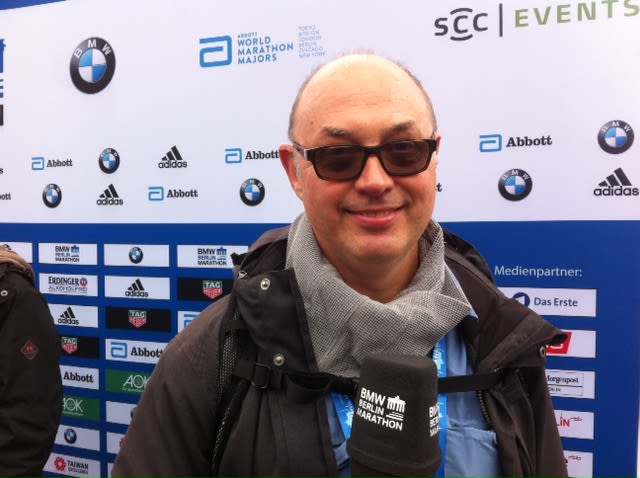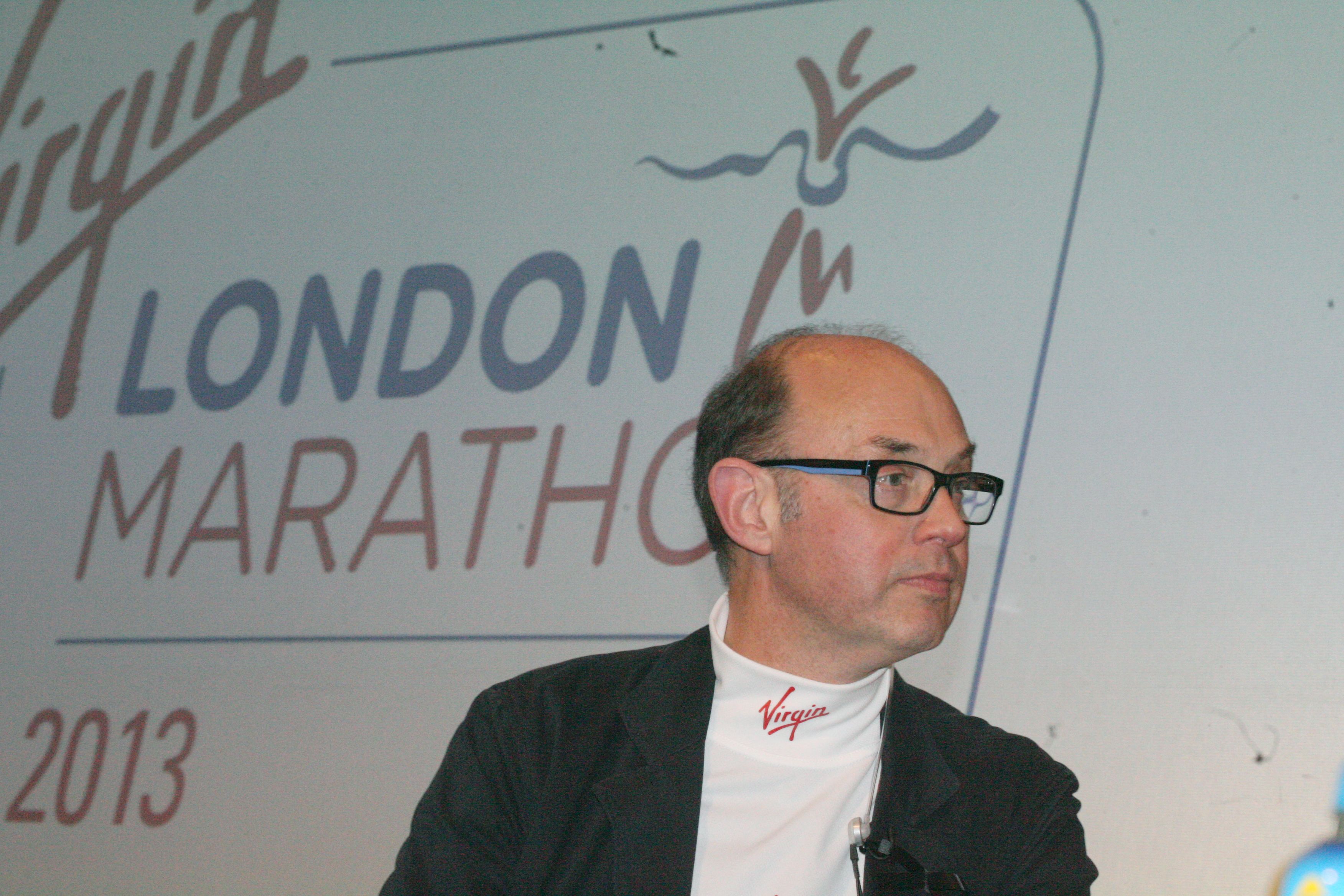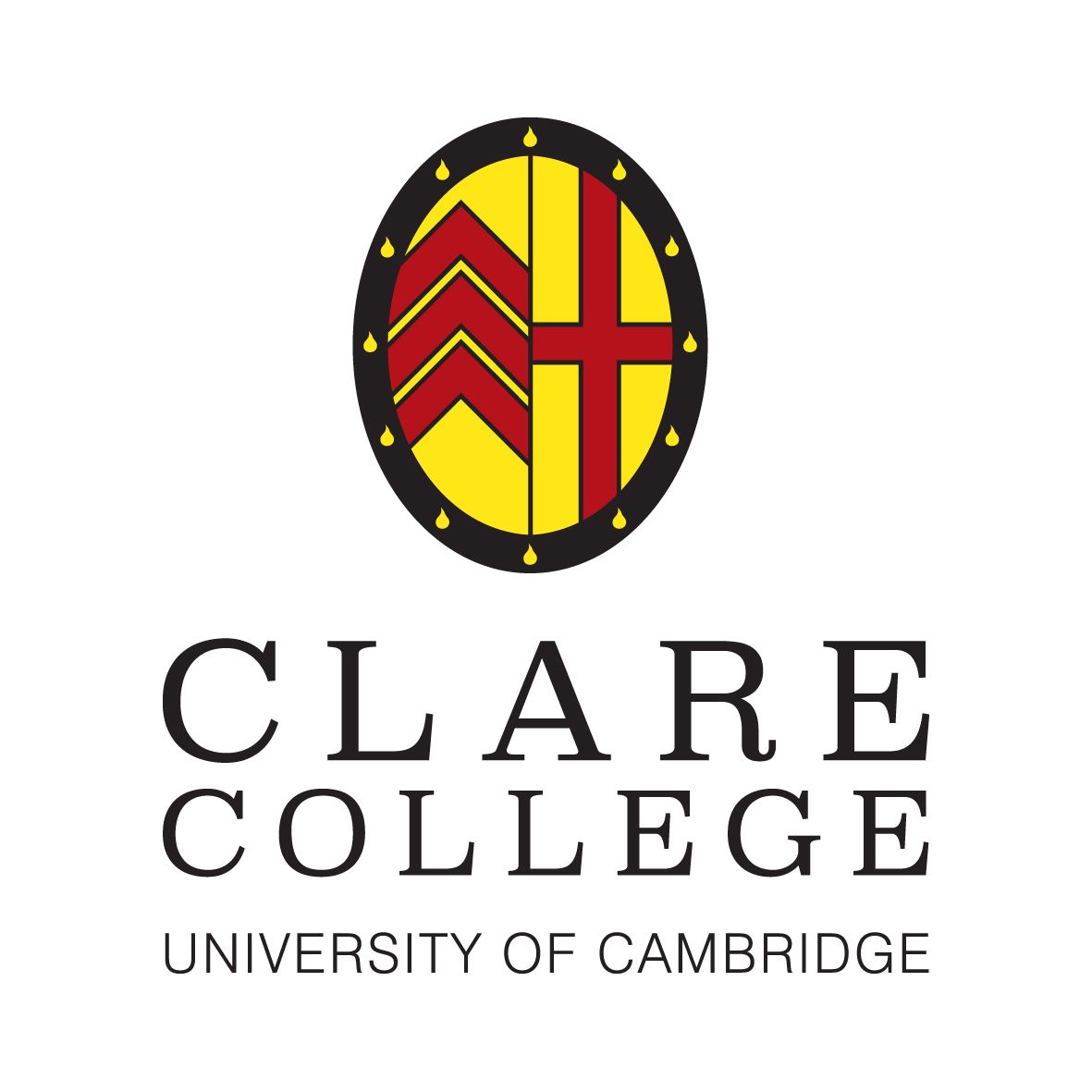In translation
A broadcaster's journey from modern languages student to global reporter
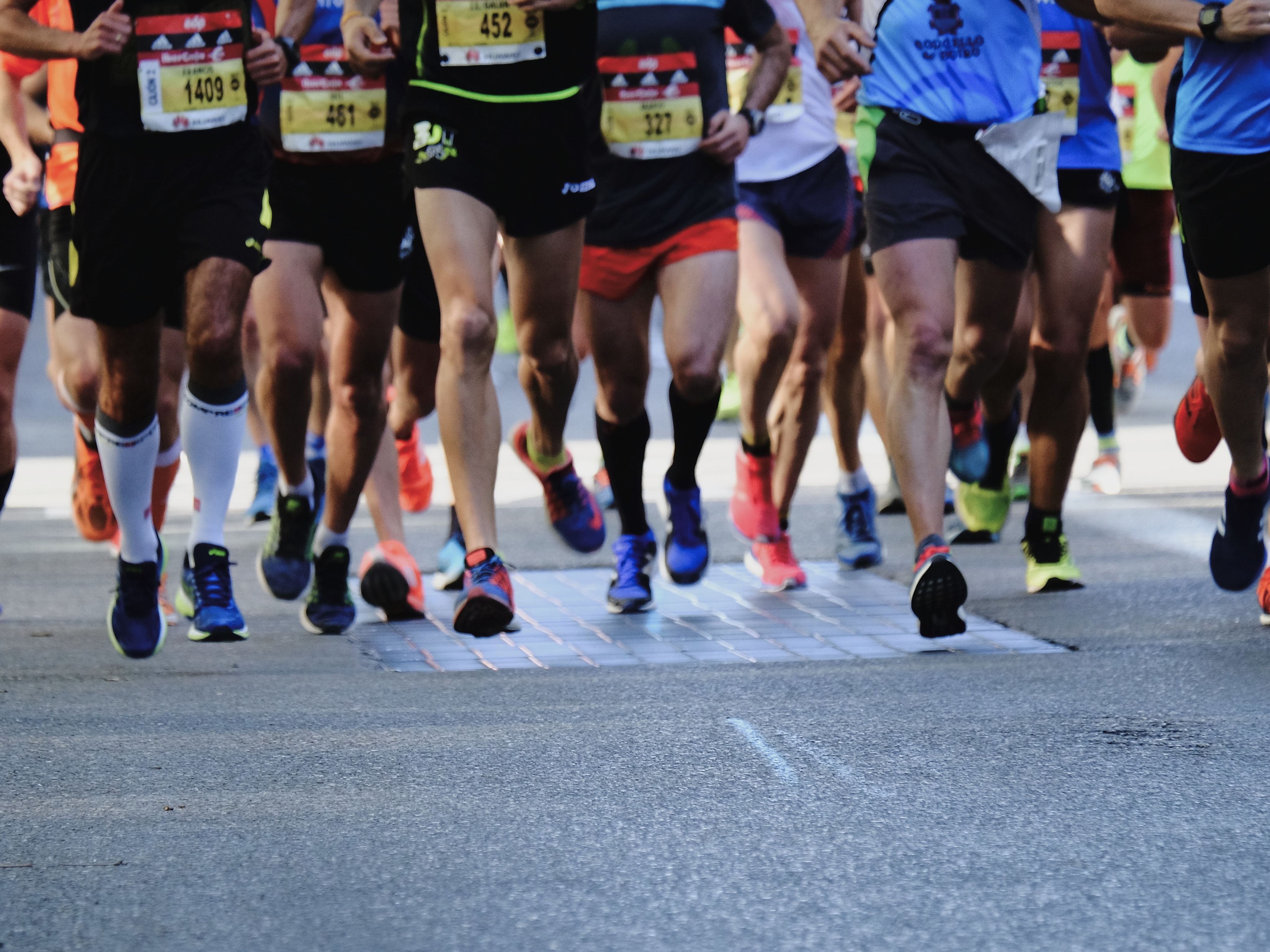
Andy Edwards (1973) is a former BBC World Service radio reporter and producer. He has been freelance for many years, using his long term working relationships with a range of news organisations across news, sport and culture to become the go to translator for many press conferences in German and English for various high profile sporting events.
On a recent visit back to College, we caught up with Andy
about his time at Clare and his experiences since.
Can you tell us a little about your background before you came to Clare in 1973?
I was born in Hong Kong in 1954 but didn’t have that much of a colonial background, I and my mother came “home” in 1959 while my father had to remain for a couple of years. He was in charge of building tankers for Shell, firstly the Hong Kong then Singapore dockyard.
Did you always want to go to University? What made you decide on Cambridge University and did you specifically choose Clare College?
Far fewer school students in general went to further education when I was a sixth former, in 1970-72. However, quite a few did from my school so, by the time I was 16, I and others were aware that there was a potential adventure beckoning of going to university, not least the chance to be away from home and, possibly, meet women. From childhood I loved learning words, using them, listening to music and stories and had a year of Latin and French at seven so I never considered doing homework in those subjects an imposition.
I did well in “A” levels, Latin, French and German but earlier, towards the first year of sixth form, our tutorial head was encouraging all five of us to apply to Oxbridge. My reaction was, why not give it a go? To their great credit, my parents never pressured me, they simply gave me love and all-round support. They had both left school at 14 so I was potentially embarking upon a path entirely unknown to them.
“By the time I was 16, I and others were aware that there was a potential adventure beckoning of going to university.”
As for the choice of Clare, that was made for me by our Modern Languages Tutor. The school had had some success in recent years with Oxbridge applications, perhaps half-a-dozen or more each year getting in overall. On reflection, the best linguist was put in for Jesus, while, let’s say the second in the rankings, also a more bohemian type, was considered to be a better bet for Clare. I first visited Clare and Cambridge for the initial interviews at the start of the scholarship term and then was called for the oral exams in French and German having done the written papers.
One coincidental point which I noted at the time and failed to mention at the interview: our “A” Level German grammar and translation book was “German for Advanced Students”, always referred to as GAS. It was written by Eric Dickins, I thought it was very good, I still have a copy, lively, full of interesting texts for translation from German to English and vice versa. The school drama teacher mentioned to me: “Eric Dickins was at Clare.” I thought such an unstuffy approach might be true of the college.
Can you share one of your favourite memories from your time at Clare?
I have two friends from my time at Clare and they are such an important part of my life. As well as often stimulating supervisors – not all but quite a few – it is the conversation, shared laughter and the sheer freedom of being away from home, the feeling that the horizon of discussion could be both deep and wide. Sometimes so much so that I would think, I’m not dining in Hall tonight because I need a break from someone talking about their research.
I also want to highlight the supervision system, both of teachers at Clare such as Malcolm Bowie for French literature in my first year, what a stimulating, intellectual gymnastic exercise that was, one to one and, in the best possible sense, no holds barred, he took my essay apart. Away from Clare, Nick Boyle at Magdalene and Erika Swales, later a fellow at King’s, spurred my development. 30 years after graduating, I contacted my former supervisors to thank them. I was a keen student, most of the time, not outstanding, and it’s only much later I have been able to relax, take stock and appreciate the unique process of the supervision system.
I graduated as a fourth-year linguist in 1977 and didn’t return to Clare until 2004. Not one step inside Old Court or anywhere else. It took a long time to process the intensity of my time here, never easy but often stimulating, but I am so glad I returned. In German, this is called “Vergangenheitsbewaeltigung”, ie coming to terms with the past and I certainly took my time about it.
You were at Clare during a time when the College was going through some major changes. Women were first admitted to the College in 1972 and the ‘Ashby era’ was coming to an end, with a new master in post by 1975. How did these events impact your time at Clare?
It was a big step and I think I and my closest male friends recognised at the time that it wasn’t an easy one for women or men. I’ve discussed this with a Clare alumna at a Samuel Blythe luncheon a few years ago. She came up in the early 1980s and said that by then, the numbers were about even so it was no big deal. For us, as part of this social development, we wanted to meet women as fellow students, future colleagues. Of course, affairs of the heart could arise and proximity could be tricky.
With hindsight I have learned how much Eric Ashby did for Clare. From what I’ve subsequently learned, he shook up a college which tended to invite “good chaps” and emphasized casting a wider net for potential, wherever it may be.
How do you feel your time at Clare studying Modern Languages impacted your career in broadcast journalism?
Firstly the skills of coping with deadlines, analysing under pressure and producing a coherent response. That would be true of any demanding degree course. Although my first job, a three-month contract in the BBC German Service, part of World Service in Bush House, London, required me to be fluent, it was only later that having fluent German and French would become an asset. First I had to prove that I was capable of being a journalist and those were the days when having a degree, let alone from Cambridge, was something not to mention to a news editor who scorned “College boys or girls who’d had it easy and reckon they know it all.” That was fine with me, I had loved radio from the age of ten and the craft of broadcast journalism and was happy to be judged.
The big change was when I went freelance from BBC World Service in 1984, freelanced as a radio producer and reporter at World Service Sport but also did many shifts at a TV news agency, Worldwide Television News (WTN now APTN). The main newsroom was in London but had bureaux worldwide. So I was continuing to be a journalist on the international front and, by chance, more scope appeared along the lines of “Oh, you speak French or you speak German, that’s handy because we need someone to go and cover…”
I was also developing a particular interest in athletics, paying my way to cover meetings abroad and offering radio coverage to BBC WS and other stations, including Capital Radio where I was a regular sports reporter from 1988 to ’91. Naturally I spoke to German and French journalists when on site, including Olympic Games, World Championships etc. but, as a linguist, I didn’t hold back from chatting with others where I had just a smattering of polite vocabulary. It meant I built up international contacts, I was remembered. A British journalist speaking a foreign language fluently is not unique but there are not that many of us.
Somehow that led to receiving offers of work where I would switch from English to German, live, as a press conference Master of Ceremonies. I became the MC for marathons in Berlin, Frankfurt and did similar work in Vienna. A partnership with a German friend and journalist in Berlin meant we had ten years of working outside the German-speaking world at road running events. It also led me to work as a translator as spin-offs: I have translated two non-fiction books with sporting themes from German.
"It’s only much later I have been able to relax, take stock and appreciate the unique process of the supervision system."
What’s the most exciting/interesting role you have done during your career?
I’ve worked in many places and many countries though have mostly seen the hotel, the venue, stadium or start and finish line, these were not holidays. That applies to Olympic Games as well, you can be counting down the days till you come home.
But what I cherish above all is having worked with some high quality fellow professionals. When someone shakes your hand and says: “Good to be working with you again,” and you know they mean it, that is what really matters.
You’ve recently got back into learning, signing up as a student to study Ancient Greek language and history. What was the driver behind this and are you enjoying being a student again?
From the little boy who liked learning and using words, listening to stories on the radio, I am distinctly mature but not that much has changed. I’m in my fifth term of Anc Greek, as our tutor likes to call it. From learning the alphabet in September 2023 we are now reading simplified texts such as Aesop’s Fables. The chance came when I discovered Oxford University’s Continuing Education Department offered a course on Byzantine Art and Culture. I attended and the tutor told me she offered Anc Greek as well, regular online seminars. We are doing the GCSE course book, she sets homework and we do it!
I find study in various forms helps give purpose to life. The pleasure of learning vocab, translating from one language to another and, even, speaking some Ancient Greek, is such fun. The companionship of our small group of students is also important. I learn from my yoga teacher, I learn from my boxing skills trainer – though we don’t hit to the head – and I’ve been a member of the same athletics club for 45 years. Knowing that there is always more to learn helps me take a positive attitude to future life.
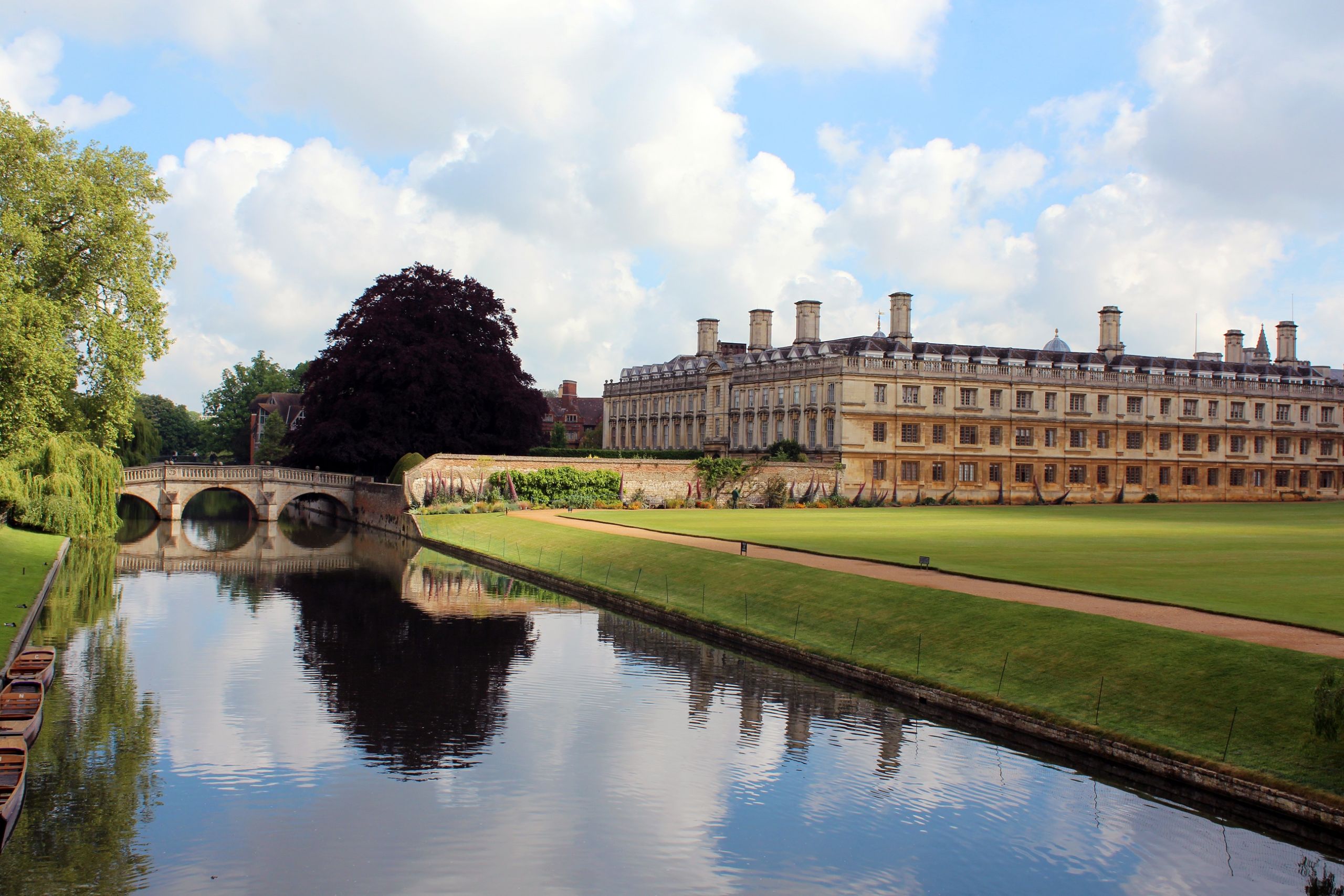
Heartland College Campus Maazin

